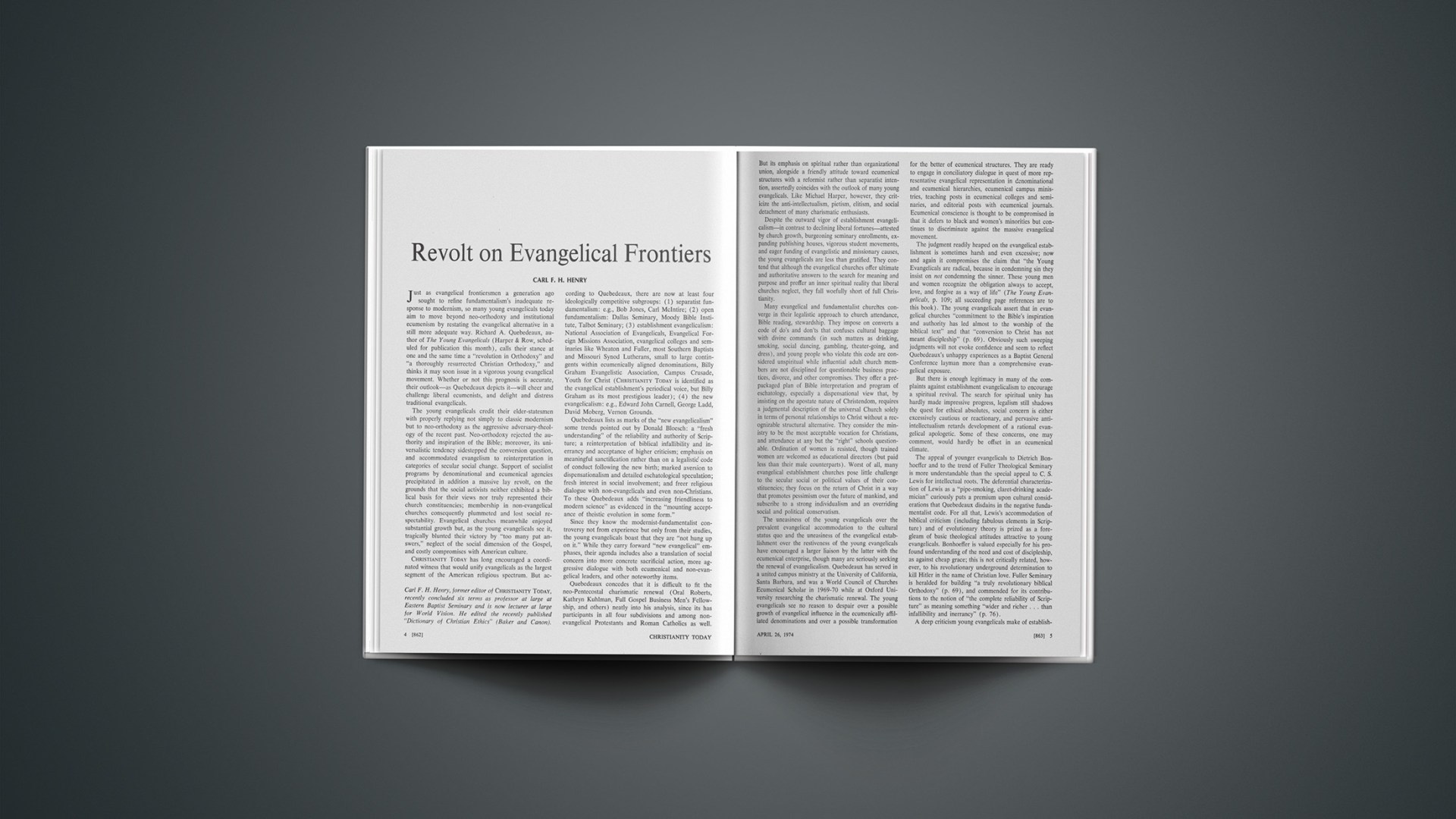Just as evangelical frontiersmen a generation ago sought to refine fundamentalism’s inadequate response to modernism, so many young evangelicals today aim to move beyond neo-orthodoxy and institutional ecumenism by restating the evangelical alternative in a still more adequate way. Richard A. Quebedeaux, author of The Young Evangelicals (Harper & Row, scheduled for publication this month), calls their stance at one and the same time a “revolution in Orthodoxy” and “a thoroughly resurrected Christian Orthodoxy,” and thinks it may soon issue in a vigorous young evangelical movement. Whether or not this prognosis is accurate, their outlook—as Quebedeaux depicts it—will cheer and challenge liberal ecumenists, and delight and distress traditional evangelicals.
The young evangelicals credit their elder-statesmen with properly replying not simply to classic modernism but to neo-orthodoxy as the aggressive adversary-theology of the recent past. Neo-orthodoxy rejected the authority and inspiration of the Bible; moreover, its universalistic tendency sidestepped the conversion question, and accommodated evangelism to reinterpretation in categories of secular social change. Support of socialist programs by denominational and ecumenical agencies precipitated in addition a massive lay revolt, on the grounds that the social activists neither exhibited a biblical basis for their views nor truly represented their church constituencies; membership in non-evangelical churches consequently plummeted and lost social respectability. Evangelical churches meanwhile enjoyed substantial growth but, as the young evangelicals see it, tragically blunted their victory by “too many pat answers,” neglect of the social dimension of the Gospel, and costly compromises with American culture.
CHRISTIANITY TODAY has long encouraged a coordinated witness that would unify evangelicals as the largest segment of the American religious spectrum. But according to Quebedeaux, there are now at least four ideologically competitive subgroups: (1) separatist fundamentalism: e.g., Bob Jones, Carl McIntire; (2) open fundamentalism: Dallas Seminary, Moody Bible Institute, Talbot Seminary; (3) establishment evangelicalism: National Association of Evangelicals, Evangelical Foreign Missions Association, evangelical colleges and seminaries like Wheaton and Fuller, most Southern Baptists and Missouri Synod Lutherans, small to large contingents within ecumenically aligned denominations, Billy Graham Evangelistic Association, Campus Crusade, Youth for Christ (CHRISTIANITY TODAY is identified as the evangelical establishment’s periodical voice, but Billy Graham as its most prestigious leader); (4) the new evangelicalism: e.g., Edward John Carnell, George Ladd, David Moberg, Vernon Grounds.
Quebedeaux lists as marks of the “new evangelicalism” some trends pointed out by Donald Bloesch: a “fresh understanding” of the reliability and authority of Scripture; a reinterpretation of biblical infallibility and inerrancy and acceptance of higher criticism; emphasis on meaningful sanctification rather than on a legalistic code of conduct following the new birth; marked aversion to dispensationalism and detailed eschatological speculation; fresh interest in social involvement; and freer religious dialogue with non-evangelicals and even non-Christians. To these Quebedeaux adds “increasing friendliness to modern science” as evidenced in the “mounting acceptance of theistic evolution in some form.”
Since they know the modernist-fundamentalist controversy not from experience but only from their studies, the young evangelicals boast that they are “not hung up on it.” While they carry forward “new evangelical” emphases, their agenda includes also a translation of social concern into more concrete sacrificial action, more aggressive dialogue with both ecumenical and non-evangelical leaders, and other noteworthy items.
Quebedeaux concedes that it is difficult to fit the neo-Pentecostal charismatic renewal (Oral Roberts, Kathryn Kuhlman, Full Gospel Business Men’s Fellowship, and others) neatly into his analysis, since its has participants in all four subdivisions and among non-evangelical Protestants and Roman Catholics as well. But its emphasis on spiritual rather than organizational union, alongside a friendly attitude toward ecumenical structures with a reformist rather than separatist intention, assertedly coincides with the outlook of many young evangelicals. Like Michael Harper, however, they criticize the anti-intellectualism, pietism, elitism, and social detachment of many charismatic enthusiasts.
Despite the outward vigor of establishment evangelicalism—in contrast to declining liberal fortunes—attested by church growth, burgeoning seminary enrollments, expanding publishing houses, vigorous student movements, and eager funding of evangelistic and missionary causes, the young evangelicals are less than gratified. They contend that although the evangelical churches offer ultimate and authoritative answers to the search for meaning and purpose and proffer an inner spiritual reality that liberal churches neglect, they fall woefully short of full Christianity.
Many evangelical and fundamentalist churches converge in their legalistic approach to church attendance, Bible reading, stewardship. They impose on converts a code of do’s and don’ts that confuses cultural baggage with divine commands (in such matters as drinking, smoking, social dancing, gambling, theater-going, and dress), and young people who violate this code are considered unspiritual while influential adult church members are not disciplined for questionable business practices, divorce, and other compromises. They offer a prepackaged plan of Bible interpretation and program of eschatology, especially a dispensational view that, by insisting on the apostate nature of Christendom, requires a judgmental description of the universal Church solely in terms of personal relationships to Christ without a recognizable structural alternative. They consider the ministry to be the most acceptable vocation for Christians, and attendance at any but the “right” schools questionable. Ordination of women is resisted, though trained women are welcomed as educational directors (but paid less than their male counterparts). Worst of all, many evangelical establishment churches pose little challenge to the secular social or political values of their constituencies; they focus on the return of Christ in a way that promotes pessimism over the future of mankind, and subscribe to a strong individualism and an overriding social and political conservatism.
The uneasiness of the young evangelicals over the prevalent evangelical accommodation to the cultural status quo and the uneasiness of the evangelical establishment over the restiveness of the young evangelicals have encouraged a larger liaison by the latter with the ecumenical enterprise, though many are seriously seeking the renewal of evangelicalism. Quebedeaux has served in a united campus ministry at the University of California, Santa Barbara, and was a World Council of Churches Ecumenical Scholar in 1969–70 while at Oxford University researching the charismatic renewal. The young evangelicals see no reason to despair over a possible growth of evangelical influence in the ecumenically affiliated denominations and over a possible transformation for the better of ecumenical structures. They are ready to engage in conciliatory dialogue in quest of more representative evangelical representation in denominational and ecumenical hierarchies, ecumenical campus ministries, teaching posts in ecumenical colleges and seminaries, and editorial posts with ecumenical journals. Ecumenical conscience is thought to be compromised in that it defers to black and women’s minorities but continues to discriminate against the massive evangelical movement.
The judgment readily heaped on the evangelical establishment is sometimes harsh and even excessive; now and again it compromises the claim that “the Young Evangelicals are radical, because in condemning sin they insist on not condemning the sinner. These young men and women recognize the obligation always to accept, love, and forgive as a way of life” (The Young Evangelicals, p. 109; all succeeding page references are to this book). The young evangelicals assert that in evangelical churches “commitment to the Bible’s inspiration and authority has led almost to the worship of the biblical text” and that “conversion to Christ has not meant discipleship” (p. 69). Obviously such sweeping judgments will not evoke confidence and seem to reflect Quebedeaux’s unhappy experiences as a Baptist General Conference layman more than a comprehensive evangelical exposure.
But there is enough legitimacy in many of the complaints against establishment evangelicalism to encourage a spiritual revival. The search for spiritual unity has hardly made impressive progress, legalism still shadows the quest for ethical absolutes, social concern is either excessively cautious or reactionary, and pervasive anti-intellectualism retards development of a rational evangelical apologetic. Some of these concerns, one may comment, would hardly be offset in an ecumenical climate.
The appeal of younger evangelicals to Dietrich Bonhoeffer and to the trend of Fuller Theological Seminary is more understandable than the special appeal to C. S. Lewis for intellectual roots. The deferential characterization of Lewis as a “pipe-smoking, claret-drinking academician” curiously puts a premium upon cultural considerations that Quebedeaux disdains in the negative fundamentalist code. For all that, Lewis’s accommodation of biblical criticism (including fabulous elements in Scripture) and of evolutionary theory is prized as a fore-gleam of basic theological attitudes attractive to young evangelicals. Bonhoeffer is valued especially for his profound understanding of the need and cost of discipleship, as against cheap grace; this is not critically related, however, to his revolutionary underground determination to kill Hitler in the name of Christian love. Fuller Seminary is heralded for building “a truly revolutionary biblical Orthodoxy” (p. 69), and commended for its contributions to the notion of “the complete reliability of Scripture” as meaning something “wider and richer … than infallibility and inerrancy” (p. 76).
A deep criticism young evangelicals make of establishment evangelicals is that they proclaim the slogan “new persons will build a new society” while ignoring man’s social side, or life in corporate society and its structures. Billy Graham is said to have been for a time commendably ahead of his evangelical constituency in his social concerns, especially in his refusal to address segregated crusades. Compared with the views of his brother-in-law Leighton Ford, however, those concerns are now considered a disappointing compromise with “the American way.” Quebedeaux notes that when Graham did take a stand, liberal ecumenists either kept silent or chided him for not doing enough; he thinks young evangelicals should support Graham’s evangelistic crusades but criticize his social and political views. Ford’s “revolutionary evangelism” is commended for correlating evangelism and social action and repudiating “the ‘second-Coming cop-out’ ” (p. 90).
Although the young evangelicals disdain cheap grace, some of their criticisms seem like cheap judgment—judgment that costs them little of the practical involvement and hard decision-making facing evangelical elder-statesmen. They at times assume a fixed stance on certain issues that other ethically sensitive evangelicals consider debatable. The young evangelicals call for a firm rejection of “the hypocrisy of American society and its ecclesiastical institutions” (p. 94). Along with Inter-Varsity and Leighton Ford, the Christian World Liberation Front is commended for supporting “the new kind of evangelism” espoused by the young evangelicals—a tag-line that seems brand-restrictive to the correlation of evangelism with criticism of American policy in domestic and foreign affairs.
It should now be clear that the young evangelicals for whom Quebedeaux presumes to speak have three distinguishing marks: (1) a reconstruction of the traditional evangelical view of the inspiration and authority of Scripture; (2) a special interest in Scripture “as a basis for action in the world” (p. 98), that is, for evangelism relevant to the whole man; and (3) over against the fundamentalist code, a restatement of moral values involved in discipleship. I will not argue the last point, nor the second properly expounded; I have made similar pleas across a quarter of a century, although without so abruptly identifying contemporary cultural indulgences as evangelical morality. The alcohol traffic and the sorry state of the cinema and theater call for something more creative than non-legalistic acceptance. And one no less interested in meaningful personal relationships may be forgiven a smile over the commendation of sensitivity training, transactional analysis, and group en counter at a time when even competent secular scholars express doubts about the adequacy of such techniques. And what is one to do with sweeping generalizations such as that fundamentalism and evangelicalism “have actually been a cause of the contemporary ecological crisis” (p. 127), or that Orthodoxy does not emphasize God’s revelation in nature (p. 128)?
On the issue of evangelical social involvement I share the disenchantment of the young evangelicals with establishment evangelicalism, but without sharing certain excesses or approving certain specifics. “The proper use of political power and economic pressure” (pp. 98 f.) is something evangelicals must indeed learn; it could, indeed, speak to the tobacco, alcohol, cinema, and other interests—including racially and economically discriminatory enterprises. Establishment evangelicals are criticized, however, for “merely treating the symptoms of social injustice rather than curing the disease itself” (p. 98), and Orthodoxy is declared to be “no less heretical than Liberalism for … neglecting the social dimension of the Gospel” (p. 121).
Marxists have long derogated Christianity’s social concern as merely a dispensing of aspirins whereas the overcoming of alienation (i.e., the class struggle) requires major surgery (socialist revolution) to remove objectionable social structures (capitalism). Such an estimate caricatures the tidal wave of human compassion unleashed upon the world by Christianity, oversimplifies the problem of alienation, confuses capitalism with the devil, divinizes socialism, and suffers from utopian enthusiasm. But it does have the merit of attempting that serious social criticism which is readily and tragically neglected by those resigned to the status quo, and it emphasizes the significance of social structures for human justice and injustice. Establishment evangelicals have given Marxists an undeserved advantage by confusing secular capitalism with the Kingdom of God (or at least defending it as if it could do no wrong and were not under the judgmental scrutiny of God as much as any other cultural manifestation) and by not articulating a courageous social ethic that deals with the practices and structures that perpetrate injustice.
The young evangelicals call for “a truly evangelical Social Gospel” (p. 101) that reflects the priorities of racial justice, the politics of conscience, the fight against poverty, and the provision of a healthful natural environment. Surely these objectives are not alien to a healthy evangelical conscience; indeed, proper understanding of the eighteenth-century Evangelical Awakening in England reveals that later fundamentalist and evangelical attitudes have shriveled a proper concern for social change.
But to say that the fight against poverty in America requires above all else “more equitable distribution of wealth, which means … higher taxes—especially for the rich” and on the world level “that the wealthy, developed nations give generously to the poorer, developing countries” (p. 124) reflects, in its heavy reliance on socialist proposals, a disappointing lack of evangelical imagination. If one thinks of perpetuating the structure of poverty, the best way to do so would be to minimize the importance of jobs, education, and literacy. Higher taxes may indeed be indispensable where voluntary solutions fail, and the sick, elderly, and destitute must in any case get immediate assistance. But socialist nations implementing Marxist economic solutions with totalitarian vengeance have hardly achieved utopian results, and in trying to overcome the insensitivities of a capitalist economy it will be well not to idealize utopian proposals that extend human disenchantment. The lack of incentive among the poor is not, as Quebedeaux would have it, “inevitable” (p. 125), nor is poverty likely to be “cured” by corporate political action (p. 126).
The call for “meaningful reconciliation between Christians of seemingly contrary ideologies” (p. 135) has its place, and to insist on proportionate representation for evangelicals in the power structures of mainstream denominations as the price of meaningful reconciliation has merit. The young evangelicals would not only take active part in local ministerial councils and councils of churches, as is already the case, but would do so on the premise of a similarity of commitment.
If the values and priorities of the Young Evangelicals and mainstream Ecumenical Liberals really are similar, continued separation serves no concrete purpose.… These young men of Evangelical persuasion might become an instrument of healing by accepting their Ecumenical counterparts, by saying words to the effect that “We accept you as brothers and sisters in Christ. Let’s pool the gifts our Lord has given us for a more effective witness” [p. 141].
Liberal pastors are encouraged to add evangelicals as staff members (p. 145 ff.), a proposal that recalls the situation in Germany, where ecumenical churches not infrequently have both a liberal and a conservative pastor to satisfy divided constituencies. We are told that ecumenical liberalism “will have to repudiate the notion … that the only heresy is Orthodoxy” (p. 146), a verdict that curiously falls short of even Barth’s denunciation of modernism as heresy. Evangelicals are criticized for insisting on “doctrinal unity in truth” rather than on “experiential unity in the Truth—Jesus Christ Himself” (p. 147), an essentially neo-orthodox and non-evangelical contrast that sheds light on the author’s theological concessions and his notion that charismatic renewal is a hopeful avenue to unity (p. 149).
Some of these proposals are so theologically nave that they do more to extend the cleavage between young evangelicals and their evangelical contemporaries than they do to achieve true unity with non-evangelicals. That evangelicals and non-evangelicals may indeed cooperate for many limited objectives is not at all in question, but that they share the same priorities and similarly understand the body of Christ turns on a semantic illusion.
I share many of the young evangelicals’ discontents: the failure of evangelicals to exhibit publicly the oneness that presupposes doctrinal unity; the failure of the Evangelical Theological Society to develop its insistence on an inerrant Bible into a bold initiative for evangelical theological positions; the failure of evangelical evangelism to speak effectively to national conscience on public issues; the failure of evangelical periodicals to rise above editorial generalities about social injustice and to chart alternatives to unjust structures for which evangelicals should strive in stipulated ways. To these disenchantments one could add others, especially the failure of evangelicals to capture the opportunity to establish a great academic center or university of national renown. One can understand also why precipitous youth tends to overreact out of a sense of regret for opportunities lost, for energy consumed in secondary controversy, for neglect of legitimate priorities while many evangelicals major in minors.
The young evangelicals seem eager for ecumenical acceptance, and this is in part due to a hard line by evangelical contemporaries devoted to the status quo. Quebedeaux thinks the greater attendance of evangelical seminarians at non-evangelical seminaries might result in a token number of evangelical faculty members and a token reward of evangelical clergy by denominational decision-making offices. If elemental justice has any meaning, however, tokenism ought to be unacceptable to an evangelical majority. The proposal, moreover, that young evangelicals become “subversives” for Christ in their home churches is hardly the best way to inspire confidence or to illumine differences within the local churches. When we are told that “the Church, like any other institution, is political” and that it “requires competent and dedicated politicians to bring about needed change” (p. 143), we need clarification, for a “more fully united and renewed church” is as unlikely to be achieved by evangelical as by non-evangelical politicians and bureaucrats, however important official leadership and decision-making may be in the Christian community. The same confusing of the Church with religious political structures seems to lurk in the notion that giving proportionate representation to evangelicals “may be the only way to save those ecclesiastical institutions from a slow and painful decline and death” (p. 146); this is a strange notion, indeed, of the salvation Christianity bears.
Quebedeaux aspires to an emerging Church that effectively integrates “the ethical, theological and experiential—the social compassion of Liberalism, the theological commitment of Evangelicalism, and the supernatural power witnessed and felt in Pentecostalism” (p. 149). This is as futile a road to evangelical renewal as is ecumenical merger, for it perpetuates the inadequacies of the contemporary churches on an alternative pattern. Moreover, it lacks a sure sense of the biblical norm, for social compassion has its authentic criterion in the prophets as messengers of revelation, theology has its authoritative ground in Scripture, and Pentecostalism like all other ecclesiastical manifestations is wholly answerable to the Risen Christ attested in the Bible.
It is in regard to a reliable revelation that Quebedeaux’s vacillating view of the Bible most fails us, whatever may be his intentions to the contrary. Scripture, we are told, is to be considered errant. Quebedeaux makes no persuasive case for our accepting as definitive the selective elements he considers important, rather than the equally fascinating alternatives propounded by other contenders for or against the future of evangelical Christianity. If the young evangelicals are to make a decisive stand for what is best in their own view, they will need to find better anchorage than an act of will reinforced by serviceable selections from the Bible. The problem of biblical authority cannot be handled as cavalierly as Quebedeaux handles it without imperiling both the goals the young evangelicals consider imperative and the foundations on which they presume to establish them.
In conclusion, I think that Quebedeaux’s representation of Jesus as a true radical crucified for his revolutionary activity (p. 117) does less than justice to his mission as Redeemer. Moreover, the confidence in “righteous social change that only political action can bring about” (p. 119) may imply too simplistic a view of fallen history, as does also the overriding implication that a radical Christian response to war and injustice requires pacifism and socialism. What is sound in Quebedeaux is the recognition that Christian faith demands a radical commitment to social justice, a commitment that subordinates confidence in any ideology, government, or system to obedience to the Lord Jesus and conforms to what the Kingdom of God requires of us at this stage in fallen history. But to say with the Post American magazine that “our faith must be distinctively Post-American” (p. 120)—rather than supra-American—is to venture a final judgment upon the nation that God has not yet uttered. Much as one may recognize the indispensability of new national priorities and goals, the young evangelicals seem excessively judgmental in speaking without qualification about “the continued pervasiveness of militarism in our national life” and about “the manifest hypocrisy of civil religion”; after all, Vietnamese mistakes aside, American might repelled Japanese aggression, toppled Hitler, checked Stalin, and frustrated Khrushchev. Civil religion, moreover, is rather inescapable and can be what we make it.
Establishment evangelicals should consider the challenge posed by the young evangelicals a summons to reinforce what is good, to debate what is controversial, and to give a biblical reason for disowning the remainder, so that the present opportunity for evangelical awakening may not be lost upon any of us.










